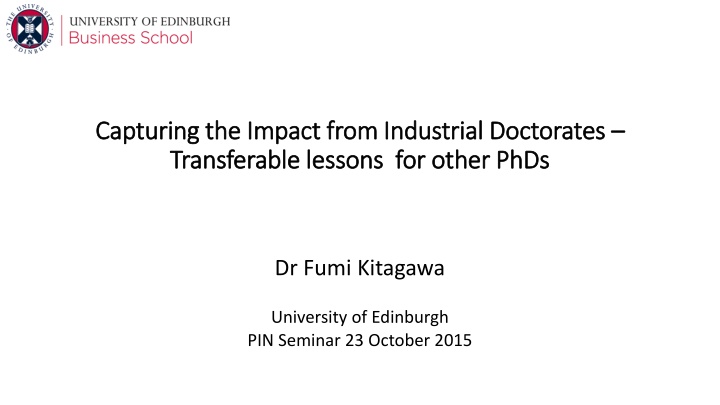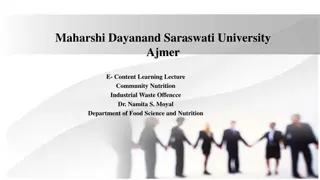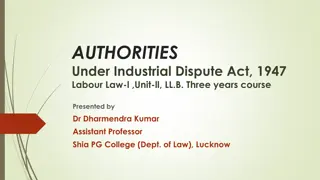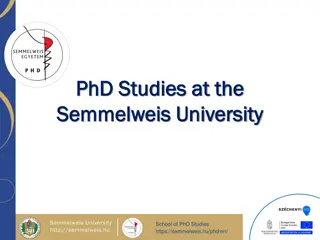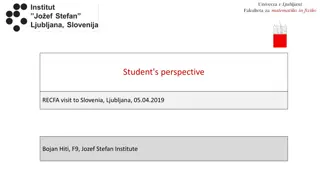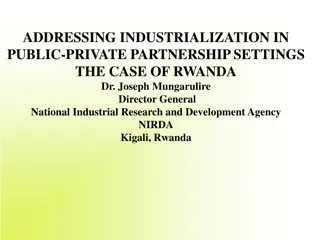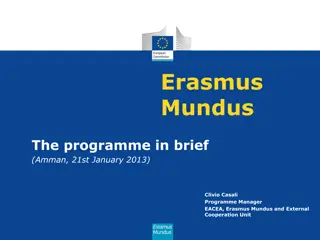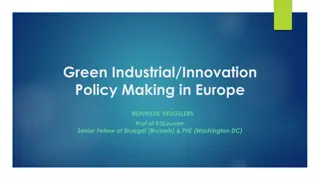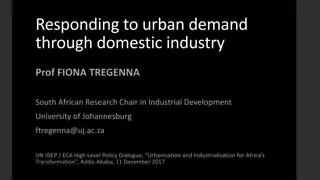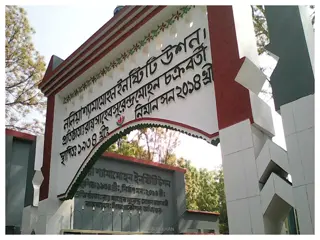Impact of Industrial Doctorates on PhD Programs: Lessons and Perspectives
This presentation explores the impact of industrial doctorates, focusing on transferable lessons for other PhD programs. It discusses the evolution of doctoral training, challenges in university-industry relationships, and the changing landscape of doctoral funding schemes in the UK. Key themes include enhancing graduate employability, rethinking doctoral education approaches, and promoting researcher-business interactions.
Download Presentation

Please find below an Image/Link to download the presentation.
The content on the website is provided AS IS for your information and personal use only. It may not be sold, licensed, or shared on other websites without obtaining consent from the author.If you encounter any issues during the download, it is possible that the publisher has removed the file from their server.
You are allowed to download the files provided on this website for personal or commercial use, subject to the condition that they are used lawfully. All files are the property of their respective owners.
The content on the website is provided AS IS for your information and personal use only. It may not be sold, licensed, or shared on other websites without obtaining consent from the author.
E N D
Presentation Transcript
Capturing the Impact from Industrial Doctorates Capturing the Impact from Industrial Doctorates Transferable lessons Transferable lessons for other PhDs for other PhDs Dr Fumi Kitagawa University of Edinburgh PIN Seminar 23 October 2015
Aim of this presentation is Capturing the Impact from Industrial Doctorates What are the Transferable lessons for other PhDs? Understanding the EngD Impact (PDF - 4.3MB) Let s look at a bit of extreme form of industry collaboration and employer engagement through doctoral training (EngD) What are the transferable lessons to other PhD programmes and cohort based schemes (e.g. CDT)? Impact of the EngD https://www.epsrc.ac.uk/newsevents/pubs/understanding-the-engd-impact-a- pilot-study/
Transferable contexts related to Doctoral training Doctoral education has created misalignments and inefficiencies in the employment market for graduates (Servage, 2009, p.765)? A growing calls for rethinking contemporary approaches to doctoral education and research training (Barnacle and Dall Alba, 2011; Halse and Mowbray, 2011) Diversifying destinations and career pathways - reconsideration of the purpose of the doctoral research training (McAlpine and Emmioglu, 2015); Development of STEM doctoral students professional identity and reforms (Hancock and Walsh, 2014)
Evolution of Policy issues in the UK Researcher development, impact, U-I collaboration, postgraduate skills Roberts Review (2002) RCUK report Excellence with Impact (2010) Vitae (2012) A career development perspective of UK researcher- business interactions 2012. Wilson review of Business University Collaboration (2012) RCUK (2015) Impact of Doctoral Careers
University-industry relationships As Perkmann and Walsh argue (2007, p.263): Relationships will often occur in conjunction with human mobility: for example, when companies sponsor Ph.D. studentships. In fact, in many cases, mobility can be intrinsic to relationships if it occurs within the context of specific collaborative projects. Limited understanding on the educational impact of university- business collaboration (Healey et al., 2014)
Changing landscape of doctoral training and EPSRC funding schemes EngD 1992 the Engineering Doctorates (EngD) 2009 Industrial Doctorate Centres (IDCs) 2009 Centre for Doctoral Training (CDT) 2013 Centre for Doctoral Training (CDT) https://www.epsrc.ac.uk/skills/students/centres/2013cdtexercise/ IDC CDT CDT There are individual PhD studentships combined with business engagement mechanisms such as Industrial CASE studentships, and Knowledge Transfer Partnerships (KTPs). BBSRC s Professional Internship for PhD Students (PIPS)
EngD/IDC Cohort based doctoral research programmes 75% of time spent in industry 25% taught courses including technical as well as business/management courses Research Engineers (REs) both stipend and employees EngD project industry driven
Capturing the Impact from Industrial Doctorates What are the transferable lessons? Methodology Exploratory study with one IDCs survey with REs (2010/11) Evaluative study included interviews with 15 EngD industry sponsors (across 10 sectors); 20 alumni from EngD Centres/IDCs (2013/14); DLHE analysis; mid-term reviews With additional 12 interviews with industry sponsors of two specific IDC (2015) ; a focus group meeting at a sponsoring company
Four routes to impacts Asked sponsoring companies about EngD/IDC impact in relation to CASE PhD, KTP etc Most of the collaborative doctoral research training would have Knowledge-based benefits and People development one way or another, but the extent to which industry partners perceive the impact from these Routes to Impact would vary. Most of the companies collaborating with doctoral research projects state that Access to talents and recruitment is the key impact sought from the collaboration. Open innovation and collaboration - Sector specificity plus centre strategies Innovation and commercial processes close contact to the market IDC uniqueness
Micro-dynamics of boundary spanning transferable competences Boundary spanning translating two identities; dual identity with the competences to work in the two systems (see Gertner et al., 2011) Barriers and unintended costs of collaborative relationship building Students with limited legitimacy voice from the coal face (see Butler and Jeffrey 2007) Need to raise awareness within the sponsoring industry
Quotes from REs - Tough lessons to be transferable .. Nobody is able to really understand the research you do, even your supervisors (unlike PhD). Makes you feel very alone, but also develops strong skills in resilience and independence. .as an RE, you see the organisation with a third eye from an academic point of view, and you are better placed to see and solve problems (only if the managers can listen!) to gain a compromise between what the different stakeholders want from the project, i.e. me, my company, my industrial supervisor, the University. Industrial supervisor was not made aware of the reason why senior management decided to go for the EngD. Also industrial supervisor is more focused on meeting short term objectives; he does not appreciate the length and benefits of research. He just needs to be educated on this.
One of the best ways of achieving a good connection between two research groups, be they two academic, or an academic and an industrial one is to have a person who is located in both, and these students fulfil that role . (academic manager of IDC) Distinctive advantage of EngD is the fact that it is applied in nature. The EngD allows much closer interactions, closer support system than the PhD. However, this is one model the spectrum of models both PhD and EngD are needed . (industry sponsor)
Concluding remarks Development of professional identity need to be better understood including the costs of the collaboration, for academic, industry as well as individual learning processes. Tacit processes of overcoming barriers and tensions would need to be legitimised as part of the learning process. More understanding and support needed for boundary spanning to make it more transferable learning.
Concluding remarks 2 A variety of forms of collaborative doctoral training schemes is a good thing. Industry partners have different needs and motivations for collaboration. Diversity of funding mechanisms need to be designed and maintained. People development is the key impact of collaborative doctoral schemes. - Educational impact of university-business collaboration. Impact from collaborative relationships needs to be captured in a more systematic way short, mid and long term.
Some links Understanding the EngD Impact (PDF - 4.3MB) http://www.aengd.org.uk/news/news-releases/engineering- doctorate-benefits-uk-plc-identified/ http://www.business-school.ed.ac.uk/research-report/four-routes- to-impacts
Acknowledgements This presentation originates from a series of studies between 2010 and 2015 Thanks to the EPSRC and AEngD, especially the AEngD sub-committee; University of Bristol; University of Manchester and the MBus student team at MBS; University of Edinburgh (Business School and School of Engineering) Those who participated in the studies, e.g. Industry sponsors, doctoral students, alumni Usual disclaimers apply. Fumi.kitagawa@ed.ac.uk
